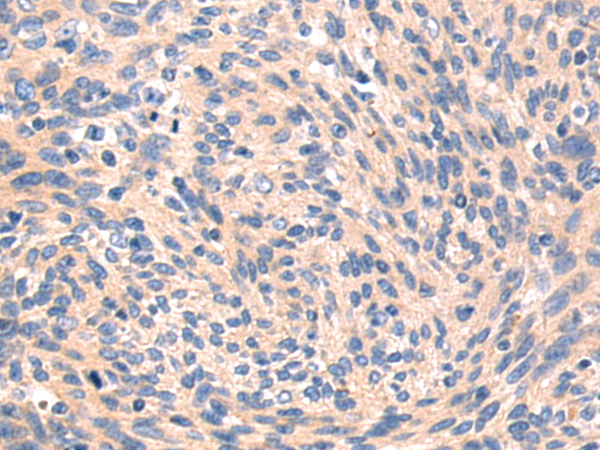
| WB | 咨询技术 | Human,Mouse,Rat |
| IF | 咨询技术 | Human,Mouse,Rat |
| IHC | 1/50-1/200 | Human,Mouse,Rat |
| ICC | 技术咨询 | Human,Mouse,Rat |
| FCM | 咨询技术 | Human,Mouse,Rat |
| Elisa | 1/5000-1/10000 | Human,Mouse,Rat |
| Aliases | CMS10; CMS1B; FADS3; C4orf25 |
| Host/Isotype | Rabbit IgG |
| Antibody Type | Primary antibody |
| Storage | Store at 4°C short term. Aliquot and store at -20°C long term. Avoid freeze/thaw cycles. |
| Species Reactivity | Human, Mouse |
| Immunogen | Synthetic peptide of human DOK7 |
| Formulation | Purified antibody in PBS with 0.05% sodium azide and 50% glycerol. |
+ +
以下是关于DOK7抗体的3篇代表性文献的简要信息:
1. **文献名称**: *Mutations in DOK7 underlie congenital myasthenic syndromes with acetylcholine receptor deficiency*
**作者**: Beeson, D. et al.
**摘要**: 该研究发现DOK7基因突变可导致先天性肌无力综合征(CMS),其机制与神经肌肉接头处乙酰胆碱受体(AChR)聚集缺陷相关。研究通过患者样本分析,证实DOK7在MuSK信号通路中起关键作用,抗体靶向DOK7可能影响突触稳定性。
2. **文献名称**: *DOK7 as a biomarker and therapeutic target in lung cancer*
**作者**: Okazaki, T. et al.
**摘要**: 本研究揭示了肺癌中DOK7基因启动子甲基化与肿瘤进展和不良预后的相关性。通过免疫组化分析,发现DOK7抗体检测可用于评估肺癌患者中DOK7蛋白表达缺失,提示其作为潜在诊断标志物和治疗靶点的价值。
3. **文献名称**: *Structural basis of the Dok-7 and MuSK interaction in neuromuscular junction formation*
**作者**: Yamanashi, Y. et al.
**摘要**: 该文献解析了DOK7蛋白与肌肉特异性激酶(MuSK)的相互作用结构,揭示了DOK7通过特定结构域激活MuSK信号通路的分子机制。研究利用DOK7抗体进行免疫共沉淀实验,证实了二者结合对神经肌肉接头发育的必要性。
以上文献均聚焦于DOK7在疾病机制、结构功能及临床诊断中的应用,可为进一步研究提供理论基础。如需具体DOI或出版年份,可补充说明。
The DOK7 antibody targets the downstream of tyrosine kinase 7 (DOK7) protein, a critical intracellular adaptor involved in neuromuscular junction (NMJ) formation and maintenance. DOK7 is part of the DOK family of proteins, which regulate tyrosine kinase signaling pathways. Structurally, it contains a pleckstrin homology (PH) domain and a phosphotyrosine-binding (PTB) domain, enabling interactions with kinases like MUSK (muscle-specific kinase). These interactions activate downstream signaling cascades, including the RAS-MAPK pathway, essential for clustering acetylcholine receptors (AChRs) at the NMJ.
Mutations in the *DOK7* gene are linked to congenital myasthenic syndromes (CMS), particularly CMS type 2C, characterized by muscle weakness due to impaired NMJ signaling. DOK7 antibodies are primarily used in research to study its expression, localization, and functional roles in cellular models or tissues. They are vital tools for Western blotting, immunohistochemistry, and co-immunoprecipitation assays to investigate DOK7-protein interactions and signaling mechanisms.
Clinically, DOK7 antibodies aid in diagnosing CMS subtypes and understanding disease mechanisms. Recent studies also explore their utility in therapeutic strategies, such as gene therapy or small-molecule interventions to restore DOK7 function. Research continues to uncover broader roles of DOK7 in cancer and immune regulation, expanding its relevance beyond neuromuscular disorders.
×